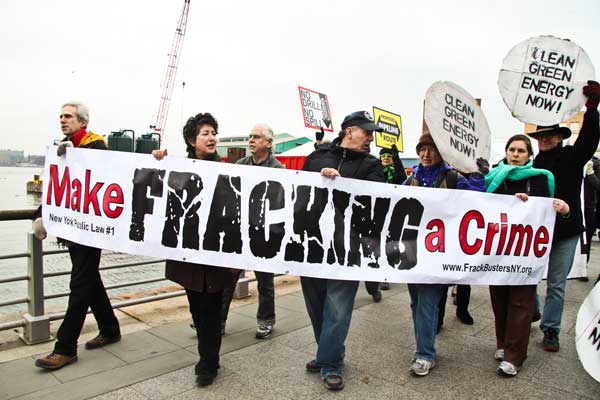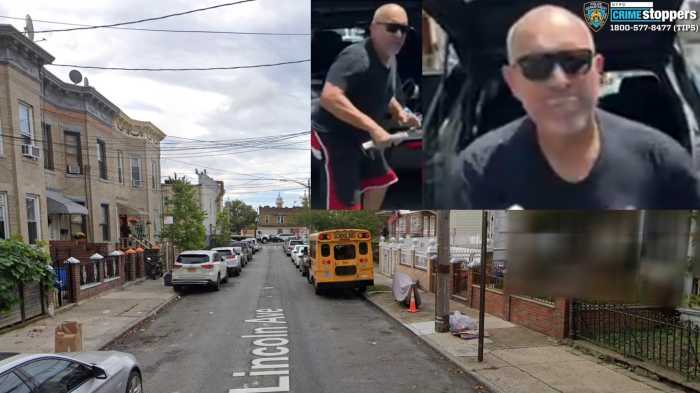
BY EILEEN STUKANE | Lawyers were out in force on Tues., Dec. 18, when State Supreme Court Justice Eileen A. Rakower heard the petition presented by Sane Energy Project — in association with five other environmental groups and several individuals — against the Hudson River Park Trust for granting an easement for Spectra Energy’s high-pressure gas pipeline.
Sane Energy is bringing suit against the Trust on the grounds that the authority failed to comply with New York State’s Environmental Quality Review Act, or SEQRA, when it allowed Spectra to lease the Gansevoort Peninsula for its natural gas pipeline.
In addition to the environmental issue, Sane’s legal filing also states that the Trust has violated the Hudson River Park Act by granting a 30-year lease to Spectra for nonpark use.
The presence of the newly constructed Spectra natural gas pipeline, which crosses under the Hudson River from New Jersey to a terminal vault by the Gansevoort Peninsula, is raising concern among Greenwich Village residents in regard to possible health risks from the radioactive radon inherent in natural gas, and safety risks from possible explosions. These issues were referenced by lawyers at the Dec. 18 hearing, but they were not the focus of the court case.
With space at a premium in the hearing room, seven lawyers from Spectra Energy, the parent company to Texas Eastern Transmission and Algonquin Transmission, were seated as spectators along a wall in an area normally reserved for a jury. Seated before the judge were five lawyers representing various interests: Shira Rosenblatt for Con Edison; Jeffrey Loop for Texas Eastern; Elizabeth Knauer for the Trust; and Jeff Zimmerman and Jonathan Geballe for Sane Energy. Sane was the “petitioner” but it would be a while before the Sane lawyer was heard.
Knauer, the lawyer representing the Trust, was first to speak. She requested that the case be dismissed. Knauer argued that the Con Edison 1,500-foot extension of the Spectra pipeline from the West Side Highway to Con Ed’s distribution terminal at W. 15th St. was outside the Trust’s jurisdiction. She also cited the Natural Gas Act, previous legal cases and the Federal Energy Regulatory Commission’s environmental impact statement, or E.I.S., as pre-empting any need for the Trust to conduct further environmental studies. As far as the issue of radon and the risk of explosion of the pipeline, she said, “FERC’s E.I.S. takes care of that.” For those representing environmental groups, that was equivalent to hearing that the fox was guarding the henhouse.
Rakower questioned whether the Trust could have refused to give Spectra Energy the 30-year lease to traverse Gansevoort Peninsula with its pipeline.
“Two million dollars seems a little bit for 30 years,” she added.
The Trust received just under $2.8 million from Spectra Energy at the lease’s signing. The lease states that this is “payment in lieu of taxes for the 30-year term.”
Knauer responded that if the Trust had refused to allow an easement and not negotiated, Spectra would have taken over the land it wanted to use through eminent domain.
During the hearing, a Spectra lawyer from the jury box stood to explain that Spectra usually does not negotiate or offer money since it has the right to eminent domain, and that Spectra wanted to work with the Trust in regard to the digging area for pipeline construction, plantings, protections. What wasn’t mentioned in court is that, according to the lease, Spectra still retains the right to eminent domain and can call upon it at any time.
Getting back to environmental concerns, Con Edison’s Rosenblatt said that the utility isn’t required to do an environmental study in order to construct a pipeline from the highway (where the Spectra pipeline ends) along 10th Ave. to W. 15th St. Department of Transportation permits for digging up the streets are all that is needed for the 30-inch pipeline to be installed, and there are thousands of feet of such 30-inch transport pipelines already in place throughout the city, she noted.
Jeffrey Loop, a lawyer for Texas Eastern, reiterated that FERC had conducted an E.I.S. and that the petitioners were seeking to halt the pipeline and nothing else. He also added that since Spectra’s was a federally approved pipeline, any legal action should take place in a federal court.
Finally, Zimmerman, one of Sane’s lawyers, stated that the FERC E.I.S. was for an interstate pipeline, and that FERC’s interstate authority ends at the city’s borders. According to the Hudson River Park Act of 1998, the Trust “shall be subject to article 8 of the environmental conservation law,” which is now absorbed into SEQRA. Sane’s argument is that the Trust ignored its legal responsibility to address the environmental concerns of the park in its care.
“There were measures that could have been applied but the Trust gave them away with the lease for the easement,” said Zimmerman. He also argued that, according to the park act, once the city’s Department of Sanitation facilities are removed from Gansevoort Peninsula, the park is to be used solely for park use. Land used for the Spectra pipeline would not be “park use,” he declared.
The arguments ended. No ruling was made. Rakower allowed all the parties to present their views and the hearing was over. The question now is whether she will dismiss the case or allow the environmental groups’ lawsuit to proceed. It could be weeks or months until the lawyers are notified of her decision.
Since permits still have to be secured, Con Ed doesn’t plan to begin constructing its northward extension of the pipeline until this coming April. The new Spectra pipeline is in place on Gansevoort but not in service.





























